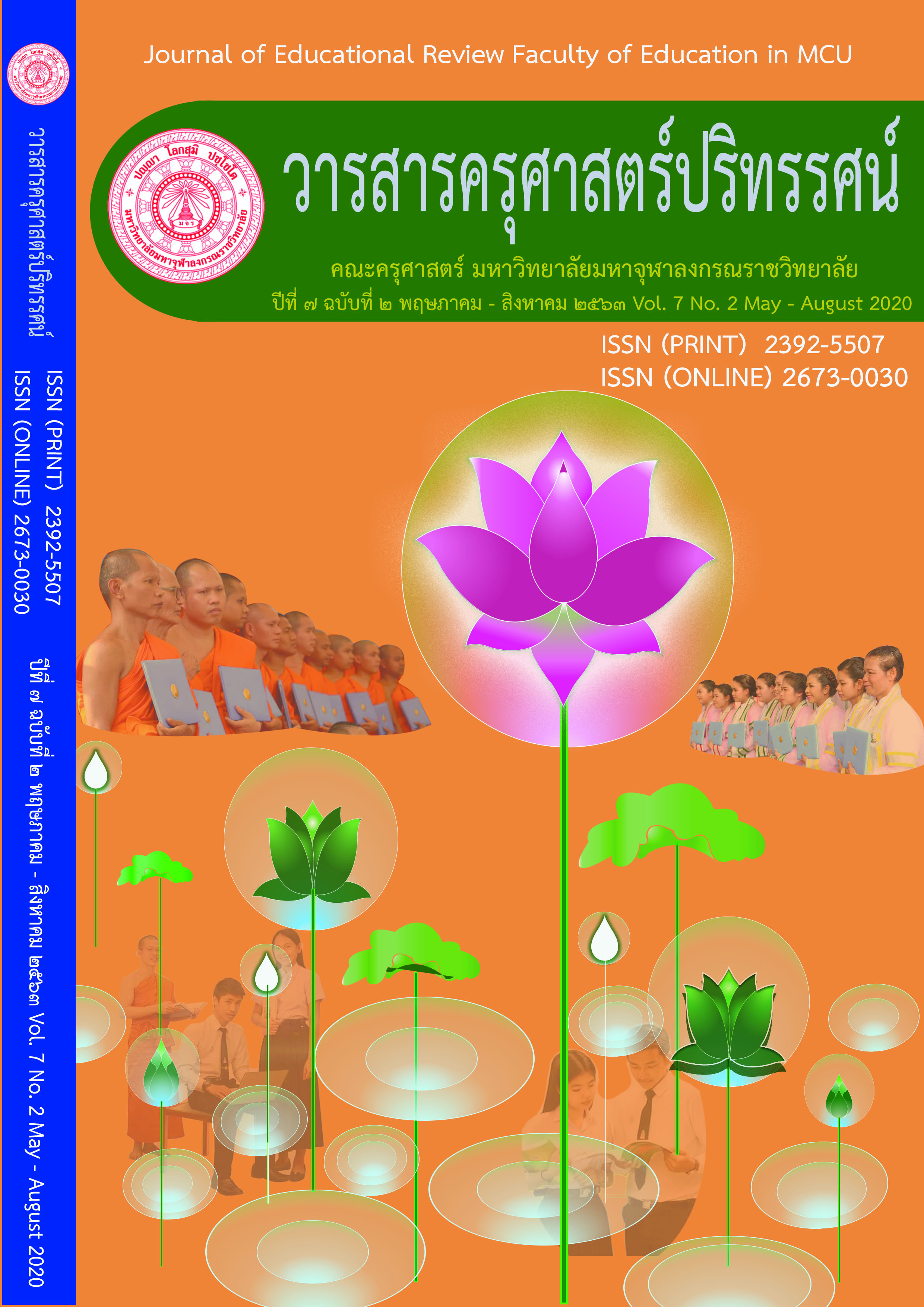THE LEARNING MANAGEMENT MODEL OF CURRICULUM FOR THAI LANGUAGE, THAI CULTURE AND THAI HISTORY IN INTERNATIONAL SECONDARY SCHOOLS
Main Article Content
Abstract
The main objective of this research paper was to develop a model of learning management for curriculum of Thai language, Thai culture and Thai history of the secondary level at international schools. It is a mixed methods research with quantitative research and qualitative research, divided into 3 steps: Step 1 was to study the condition and management guidelines for learning management of Thai language courses, Thai culture and Thai history by using questionnaires, the samples used in the research were the heads of the Thai language department and 60 teachers of the Thai language department in international schools in Bangkok. In-depth interviews with qualifications and experts including 10 international school directors was conducted and was selected by purposive sampling. Step 2 was to develop a model by 5 highly qualified experts. Step 3 was to evaluate the draft model. The research target group was 60 international school directors and heads of Thai language departments and was selected by purposive sampling. The results of the research were as follows: 1) The condition of learning management of Thai language courses, Thai culture and Thai history at the secondary education level in international schools showed general in practice at a high level. 2) The learning management model of Thai language courses, Thai culture and Thai history at the level of secondary education in international schools consisted of 3 components: 1) curriculum improvement, 2) process of learning management, and 3) 4 factors promoting learning management. 3) Results of assessing the validity of the learning management model, curriculum, Thai language, Thai culture and Thai history in international schools both overall and each component was at the highest level.
Article Details
ทัศนะและความคิดเห็นที่ปรากฏในบทความในวารสารฉบับนี้ถือเป็นความรับผิดชอบของผู้เขียนบทความนั้นเพียงผู้เดียว และไม่ถือเป็นทัศนะและความรับผิดชอบของกองบรรณาธิการ
กองบรรณาธิการขอสงวนสิทธิ์ในการคัดเลือกบทความลงตีพิมพ์และจะแจ้งให้เจ้าของบทความทราบหลังจากผู้ประเมินบทความตรวจอ่านบทความแล้ว
ต้นฉบับที่ได้รับการตีพิมพ์ในวารสารครุศาสตร์ปริทรรศน์ คณะครุศาสตร์ มหาวิทยาลัยมหาจุฬาลงกรณราชวิทยาลัย ถือเป็นกรรมสิทธิ์ของคณะครุศาสตร์ มหาวิทยาลัยมหาจุฬาลงกรณราชวิทยาลัย ห้ามนำข้อความทั้งหมดหรือบางส่วนไปพิมพ์ซ้ำ เว้นเสียแต่ว่าจะได้รับอนุญาตจากมหาวิทยาลัยฯ เป็นลายลักษณ์อักษร
References
ทิศนา แขมมณี. (2560). ศาสตร์การสอน: องค์ความรู้เพื่อการจัดกระบวนการเรียนรู้ที่มีประสิทธิภาพ. พิมพ์ครั้งที่ 21 กรุงเทพมหานคร: โรงพิมพ์แห่งจุฬาลงกรณ์มหาวิทยาลัย.
นันทพร เลิศประเสริฐคง.(2552). สภาพและปัญหาการบริหารโปรแกรมภาษาและวัฒนธรรมไทยของโรงเรียนนานาชาติ. วิทยานิพนธ์คุรุศาสตร์มหาบัณฑิต. จุฬาลงกรณ์มหาวิทยาลัย.
ปัทมา นาคะสนธิ์. (2540). การพัฒนาหลักสูตรภาษาและวัฒนธรรมไทยระดับอนุบาลสำหรับเด็กไทยในโรงเรียนนานาชาติ. วิทยานิพนธ์คุรุศาสตร์มหาบัณฑิต. จุฬาลงกรณ์มหาวิทยาลัย.
ผุสดี ตรงต่อการ. (2540). การศึกษาการบริหารงานวิชาการของโรงเรียนนานาชาติในกรุงเทพมหานครและปริมณฑล. วิทยานิพนธ์คุรุศาสตร์มหาบัณฑิต. จุฬาลงกรณ์มหาวิทยาลัย
สำนักงานคณะกรรมการส่งเสริมการศึกษาเอกชน. (2551). นโยบายการจัดการเรียนการสอนวิชาภาษาและวัฒนธรรมไทยในโรงเรียนนานาชาติและข้อค้นพบจากการตรวจเยี่ยมประกันคุณภาพภายใน. โรงเรียนเอกชน. กรุงเทพเทพมหานคร: กระทรวงศึกษาธิการ.
สำนักงานคณะกรรมการส่งเสริมการศึกษาเอกชน. (2558). ประกาศสำนักงานคณะกรรมการส่งเสริมการศึกษาเอกชน เรื่อง โรงเรียนเอกชนประเภทนานาชาติที่มีระบบประกันคุณภาพภายในสถานศึกษา ประจำปีงบประมาณ พ.ศ. 2558. แหล่งที่มา https://sites.google.com/a/opec.go.th/opec/matrthan-kar-suksa-kn สืบค้นเมื่อ 25 ต.ค. 2560.
หลักสูตรเคมบริดจ์ First Language Thai. (2018). CAMBRIDGE INTERNATIONAI EXAMINATION. แหล่งที่มา http://www.cambridgeinternational.org/programmes-and-qualifications/canbridge-igcse-thai-first-language-0518/ สืบค้นเมื่อ 3 พ.ค. 2561
Cambridge candidate grades June 2017. (2018). Cambridge Internal Examinations. แหล่งที่มา https://www.cambridgeinternational.org/Images/413612-cambridge-igcse-results-statistics-june-2017.pdf สืบค้นเมื่อ 7 มิ.ย. 2561


